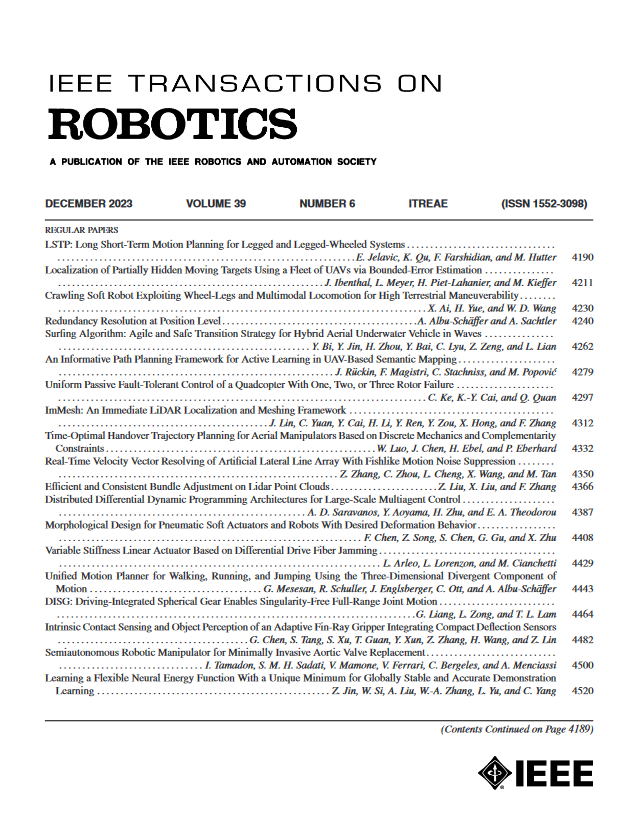基于时间最优空间迭代学习的高效向量场
IF 10.5
1区 计算机科学
Q1 ROBOTICS
引用次数: 0
摘要
为了提高移动机器人矢量场导航的效率,提出了一种新的无模型空间迭代学习(IL)框架。通过将迭代学习控制(ILC)控制思想与VF相结合,该框架利用历史数据显著提高了导航效率,减少了遍历时间,扩展了迭代学习控制在快速导航中的适用性。重要的是,它具有较低的时间复杂度,每次迭代$O(n)$,其中$n$表示路点数量,避免了由于现有方法中不断增加的路点而导致的显著计算开销,通常超过$O(n^{2})$,使其非常适合实时规划。此外,该方法本质上是无模型的,依赖于历史数据,因此可以在有限依赖复杂模型细节的情况下实现敏捷导航。本文对系统的稳定性、时间最优性、时间复杂度、参数不敏感性、鲁棒性和使用进行了全面的理论分析。大量的仿真和实验突出了其效率,有望通过所提出的IL对移动机器人导航产生变革性影响。本文章由计算机程序翻译,如有差异,请以英文原文为准。
High-Efficiency Vector Field by Time-Optimal Spatial Iterative Learning
This article presents a novel model-free spatial iterative learning (IL) framework to enhance the efficiency of vector field (VF) navigation for mobile robots. By integrating the idea of iterative learning control (ILC) control with VF, this framework utilizes historical data to enhance navigation efficiency significantly, reducing traversal time and expanding the applicability of IL to rapid navigation. Importantly, it has low-time complexity with $O(n)$ $n$ $O(n^{2})$
求助全文
通过发布文献求助,成功后即可免费获取论文全文。
去求助
来源期刊

IEEE Transactions on Robotics
工程技术-机器人学
CiteScore
14.90
自引率
5.10%
发文量
259
审稿时长
6.0 months
期刊介绍:
The IEEE Transactions on Robotics (T-RO) is dedicated to publishing fundamental papers covering all facets of robotics, drawing on interdisciplinary approaches from computer science, control systems, electrical engineering, mathematics, mechanical engineering, and beyond. From industrial applications to service and personal assistants, surgical operations to space, underwater, and remote exploration, robots and intelligent machines play pivotal roles across various domains, including entertainment, safety, search and rescue, military applications, agriculture, and intelligent vehicles.
Special emphasis is placed on intelligent machines and systems designed for unstructured environments, where a significant portion of the environment remains unknown and beyond direct sensing or control.
 求助内容:
求助内容: 应助结果提醒方式:
应助结果提醒方式:


